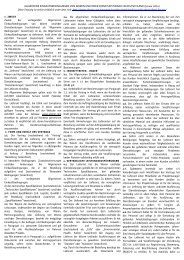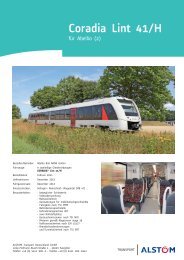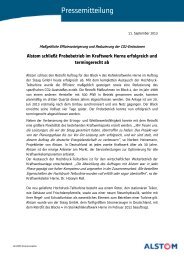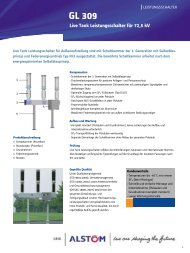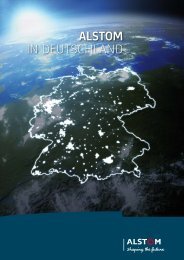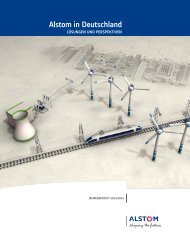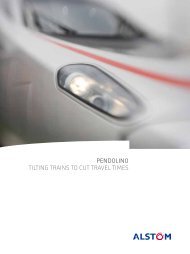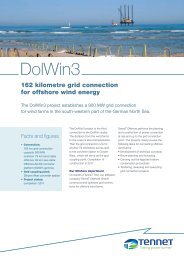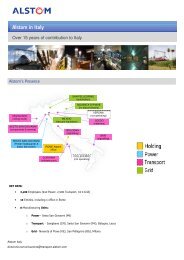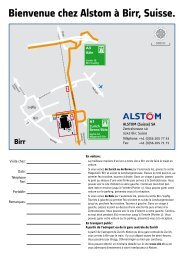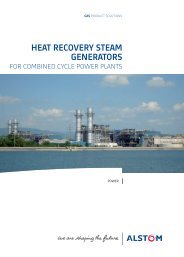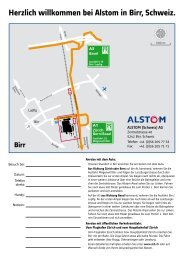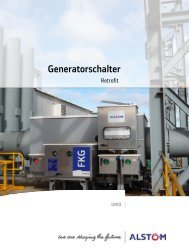MOROCCO IS ACCELERATING! feature - Alstom
MOROCCO IS ACCELERATING! feature - Alstom
MOROCCO IS ACCELERATING! feature - Alstom
Create successful ePaper yourself
Turn your PDF publications into a flip-book with our unique Google optimized e-Paper software.
In partnership with our suppliers and partners<br />
it will boost the entire Moroccan industrial<br />
base, and in particular SMEs. It will favour<br />
the development of national expertise<br />
in the rail sector and the sector’s export,<br />
as well as technology and technical transfer.<br />
In this way, the high-speed train will make<br />
a remarkable contribution to Morocco’s<br />
positioning as a regional industrial platform<br />
and favour the emergence of viable and<br />
sustainable economic activities whose<br />
infl uence will extend beyond our frontiers.<br />
Is this strategic choice being made<br />
to the detriment of other national rail sectors<br />
and regional services?<br />
No, on the contrary. The contract-programme<br />
2005-2009 signed between the ONCF<br />
and the State already allocated an investment<br />
of about €1.7 billion to modernise the conven-<br />
tional network and improve its capacity.<br />
The target was met. The initial operating<br />
objectives set under the contract-programme<br />
have been considerably exceeded:<br />
the ONCF accomplished average annual sales<br />
of 250 million euros compared with the budg-<br />
eted 225 million euros, with an operating<br />
result of more than 70 million euros, compared<br />
with an expected 44 million euros. Our<br />
self-fi nancing capacity has notably exceeded<br />
the level initially set.<br />
Encouraged by these results, the ONCF<br />
has recently signed a new contract with<br />
the state authorities for the period 2010-2015.<br />
This includes an investment programme<br />
of nearly 3 billion euros, with 1.8 billion euros<br />
allocated for the high-speed train and<br />
1.2 billion euros for the development and<br />
modernisation of conventional lines. We will<br />
in this way be able to reinforce capacity on<br />
certain priority routes: tripling track between<br />
Casablanca and Kenitra, partial doubling<br />
between Settat and Marrakech, electrifi cation<br />
and modernisation for the Fes-Oujda line.<br />
Not to mention deploying logistics platforms,<br />
continuing to modernise stations and<br />
to update safety and signalling systems<br />
to make them compliant.<br />
I would like to make one fi nal point,<br />
more fundamental than it may appear.<br />
What we are developing with very high<br />
speed in terms of management expertise,<br />
commercial know-how and project<br />
management techniques will benefi t<br />
all our other projects. Very high speed will<br />
permit a major development of all services<br />
offered, both upstream and downstream<br />
of the journey, and will be a vehicle<br />
for our ambition to provide quality for all our<br />
customers, without exception. The station<br />
renovation we have begun is an excellent<br />
example of this. Stations will become hubs.<br />
Everything is being conceived to favour<br />
intelligent complementarity, the key<br />
to intermodality: easy access car parking,<br />
nearby taxi ranks and bus terminals and,<br />
of course, a large number of connections<br />
with urban and suburban rail services.<br />
Does the intermodality you mentioned<br />
include the many urban and<br />
suburban projects currently in progress?<br />
Indeed! In general, we are convinced<br />
that enhanced access for users at each<br />
link of the transport chain favours<br />
the competitiveness of the entire rail sector.<br />
For instance, the tramway stations at<br />
Casablanca and Rabat were specifi cally<br />
sited to be close to the railway stations,<br />
thereby facilitating passenger transfers<br />
and fl ows. Another example of this policy:<br />
a major consultation was held with all<br />
stakeholders – State, cities, local authorities,<br />
ONCF… – to build suburban services<br />
similar to the RER in the two urban areas.<br />
There is a marked priority for Casablanca,<br />
which should receive a 63 km line<br />
for a total investment estimated at about<br />
900 million euros.<br />
These structural projects will only be entirely<br />
successful, however, if they are part<br />
of a true multimodal system, with a global<br />
transport plan that is both consistent and<br />
standardised. The administrative and fi nancial<br />
arrangements are progressing and the ONCF<br />
will be providing its know-how-for their<br />
implementation, operation and harmonious<br />
integration.<br />
The Rabat station clock.<br />
19



